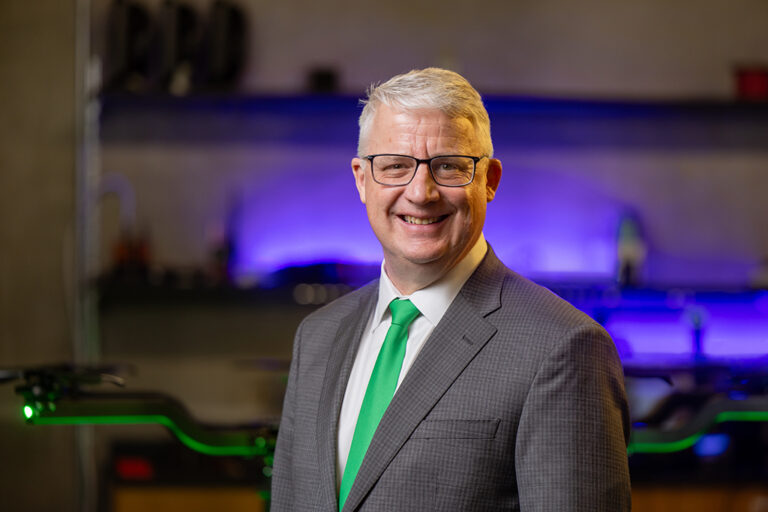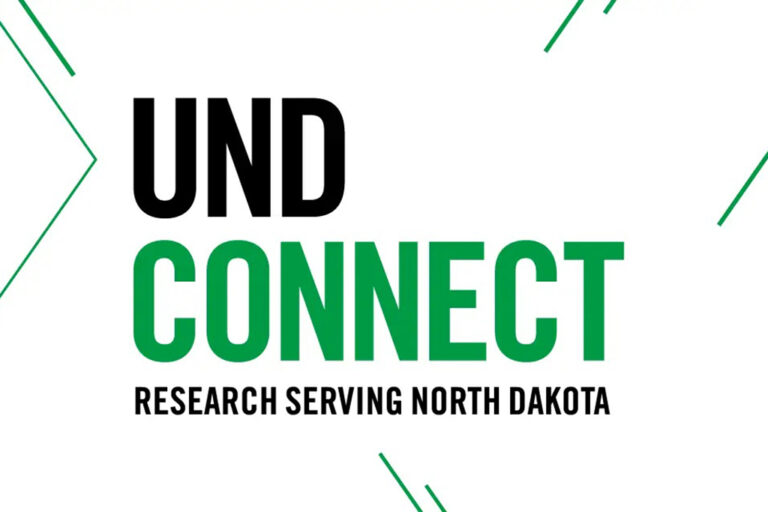‘Speed dating’ for research
Thomasine Heitkamp heads up event helping feds and researchers address rural health and social issues

It’s a researcher’s dream. Imagine having one-on-one access to multiple representatives of federal agencies, all of whom have resources available to help address rural health care and social issues.
That dream came true for the 100 people who attended the UND Discovery grand challenge event earlier this week.
Representatives from eight federal agencies came to campus at their own expense to discuss grant and research opportunities and to solicit proposals for some programs.
The University has the capacity to help solve rural issues, said Thomasine Heitkamp, who with grand challenge team members invited the federal representatives.
The ultimate goal is to serve rural North Dakota, said Heitkamp, professor in the College of Nursing & Professional Disciplines and a strategic plan grand challenge champion for the discovery goal. She noted that the event was held during National Rural Health Week.
“Rural and health issues are my passion, and this is an energetic, great group of people,” said Heitkamp. “They can provide an overview of federal resources that are available to help solve unique problems in rural communities.”

Networking
Attendees were able to “speed network” with the representatives. Similar to “speed dating,” it allowed researchers to interact and visit with representatives about their particular research.
That’s a rare opportunity, said Heitkamp.
Equally rare was hearing directly how agencies help rural communities and the types of research and education they help fund. A panel discussion allowed participants to learn even more about submitting proposals.
The day was capped by a solicitation for proposals.

Joining the challenge
“We will join you in this challenge,” said Charles Smith, regional administrator for the Substance Abuse and Mental Health Services Administration (SAMHSA), which provides funding and programs for mental health and substance abuse and recovery treatment. “We will collaborate with you to make a difference.”
“It’s easy to share a laugh with Thomasine, and almost impossible to say no to her,” said Dennis Mohatt, vice president for Behavioral Health, Western Interstate Commission for Higher Education (WICHE). “UND is a leader in rural health research, and we want to try to help.”
“Our mission is access,” said Erica Grover, deputy regional administrator for the Health Resources and Services Administration (HRSA), who noted that UND has received $5.2 million this year to solve rural problems such as the opioid epidemic, childhood obesity and mental illness.
“I love to bring opportunities for collaboration,” said Jere Mock, vice president for programs and services for the Western Interstate Commission for Higher Education (WICHE), noting that Heitkamp has previously received collaborative support and structure to share online coursework between universities.
Four other representatives, some of them UND alumni, discussed their programs and how researchers could help them fulfill their missions. They included Laurie Konsella, acting regional health authority for the Office of the Assistant Secretary of Health (OASH); David Von Behren, regional public affairs director, U.S. Department of Agriculture (USDA) Food & Nutrition Service; Bill Davis, Rural Extension Center, USDA; and Joel Manske, field office director, Department of Housing and Urban Development (HUD).
Incredible expertise

“We have a wide range of incredible expertise in this room,” said Jeff Holm, faculty fellow and professor and chair of psychology, who moderated the panel discussion. “I think it’s a really good opportunity to meet these people. It’s pretty rare to find representatives of different agencies in one room who are willing to talk to people as a group and individually.”
“This is a great opportunity to get together, learn from experts, and learn about resources available for social and rural communities,” said Grant McGimpsey, vice president for research and economic development, as he welcomed the participants.

“I’ve been involved in a lot of strategic plans,” McGimpsey continued. “Usually the strategic plan stops after the plan. Not here. We immediately started implementing our plan.” He explained that one of the goals is discovery, which includes research, scholarship and creative activities. There are five grand challenges within that goal, he added, and one of them is to meet the health and social challenges of rural communities.
“This is aligned with UND’s strengths,” said McGimpsey. “It’s a great chance to meet folks from the federal side and to benefit from their knowledge. Thomasine, the champion of this Grand Challenge, put together a great team.”
That team includes Amir Alakaam, assistant professor of nutrition & dietetics; Laura Hand, assistant professor of political science & public administration; Ashley Hutchison, assistant professor of counseling; Adam Matz, assistant professor of criminal justice; Joelle Ruthig, associate professor of psychology; Shawnda Schroeder, assistant professor of rural health research; and Chih Ming Tan, professor of economics.
“I am thrilled with the outcome,” said Heitkamp, who noted the event had to be restructured to accommodate nearly twice as many people as expected. “It identified funding streams and began collaborations. It greatly exceeded my expectations.”


